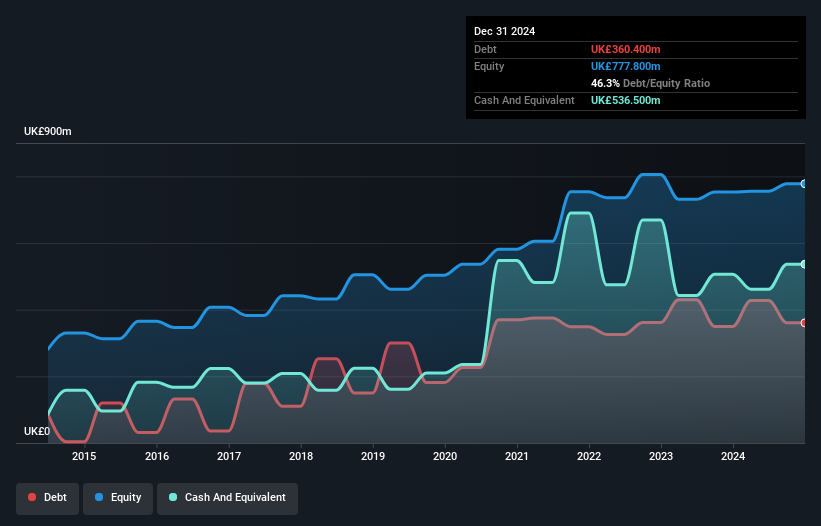David Iben put it well when he said, 'Volatility is not a risk we care about. What we care about is avoiding the permanent loss of capital.' When we think about how risky a company is, we always like to look at its use of debt, since debt overload can lead to ruin. As with many other companies Savills plc (LON:SVS) makes use of debt. But is this debt a concern to shareholders?
Our free stock report includes 2 warning signs investors should be aware of before investing in Savills. Read for free now.When Is Debt Dangerous?
Debt is a tool to help businesses grow, but if a business is incapable of paying off its lenders, then it exists at their mercy. Ultimately, if the company can't fulfill its legal obligations to repay debt, shareholders could walk away with nothing. While that is not too common, we often do see indebted companies permanently diluting shareholders because lenders force them to raise capital at a distressed price. Of course, plenty of companies use debt to fund growth, without any negative consequences. When we think about a company's use of debt, we first look at cash and debt together.
How Much Debt Does Savills Carry?
The chart below, which you can click on for greater detail, shows that Savills had UK£360.4m in debt in December 2024; about the same as the year before. But it also has UK£536.5m in cash to offset that, meaning it has UK£176.1m net cash.

How Strong Is Savills' Balance Sheet?
According to the last reported balance sheet, Savills had liabilities of UK£1.09b due within 12 months, and liabilities of UK£381.5m due beyond 12 months. Offsetting these obligations, it had cash of UK£536.5m as well as receivables valued at UK£678.8m due within 12 months. So it has liabilities totalling UK£258.2m more than its cash and near-term receivables, combined.
Since publicly traded Savills shares are worth a total of UK£1.29b, it seems unlikely that this level of liabilities would be a major threat. Having said that, it's clear that we should continue to monitor its balance sheet, lest it change for the worse. Despite its noteworthy liabilities, Savills boasts net cash, so it's fair to say it does not have a heavy debt load!
Check out our latest analysis for Savills
In addition to that, we're happy to report that Savills has boosted its EBIT by 59%, thus reducing the spectre of future debt repayments. When analysing debt levels, the balance sheet is the obvious place to start. But it is future earnings, more than anything, that will determine Savills's ability to maintain a healthy balance sheet going forward. So if you're focused on the future you can check out this free report showing analyst profit forecasts.
Finally, while the tax-man may adore accounting profits, lenders only accept cold hard cash. Savills may have net cash on the balance sheet, but it is still interesting to look at how well the business converts its earnings before interest and tax (EBIT) to free cash flow, because that will influence both its need for, and its capacity to manage debt. During the last three years, Savills generated free cash flow amounting to a very robust 84% of its EBIT, more than we'd expect. That positions it well to pay down debt if desirable to do so.
Summing Up
While Savills does have more liabilities than liquid assets, it also has net cash of UK£176.1m. The cherry on top was that in converted 84% of that EBIT to free cash flow, bringing in UK£138m. So is Savills's debt a risk? It doesn't seem so to us. There's no doubt that we learn most about debt from the balance sheet. But ultimately, every company can contain risks that exist outside of the balance sheet. Case in point: We've spotted 2 warning signs for Savills you should be aware of.
At the end of the day, it's often better to focus on companies that are free from net debt. You can access our special list of such companies (all with a track record of profit growth). It's free.
New: Manage All Your Stock Portfolios in One Place
We've created the ultimate portfolio companion for stock investors, and it's free.
• Connect an unlimited number of Portfolios and see your total in one currency
• Be alerted to new Warning Signs or Risks via email or mobile
• Track the Fair Value of your stocks
Have feedback on this article? Concerned about the content? Get in touch with us directly. Alternatively, email editorial-team (at) simplywallst.com.
This article by Simply Wall St is general in nature. We provide commentary based on historical data and analyst forecasts only using an unbiased methodology and our articles are not intended to be financial advice. It does not constitute a recommendation to buy or sell any stock, and does not take account of your objectives, or your financial situation. We aim to bring you long-term focused analysis driven by fundamental data. Note that our analysis may not factor in the latest price-sensitive company announcements or qualitative material. Simply Wall St has no position in any stocks mentioned.
About LSE:SVS
Savills
Engages in the provision of real estate services in the United Kingdom, Continental Europe, the Asia Pacific, Africa, North America, and the Middle East.
Excellent balance sheet, good value and pays a dividend.
Similar Companies
Market Insights
Community Narratives



